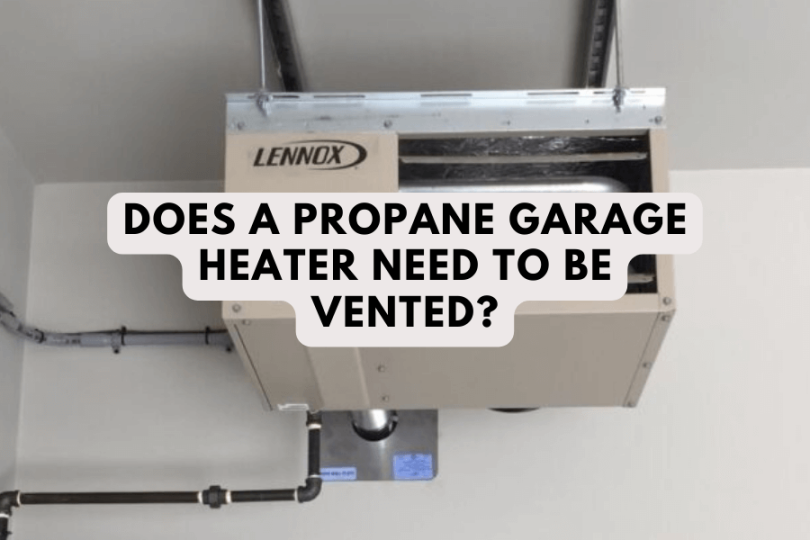Introduction
Choosing a heating solution for your garage can be a challenging task given the myriad of options available. Among the contenders, a propane gas heater stands out as one of the most effective choices for keeping your garage warm. However, the crucial question arises: Does your propane garage heater need vent? In this comprehensive guide, we explore the intricacies of propane garage heaters, focusing on the vital aspect of ventilation to ensure safety and optimal performance.
The Importance of Ventilation
Like most heating systems, propane gas heaters demand adequate ventilation for optimal functionality. Propane heaters rely on oxygen for combustion, and insufficient ventilation not only compromises their efficiency but also poses serious risks, including the potential for carbon monoxide poisoning.
How Propane Gas Heaters Operate
Before delving into the specifics of ventilation, it’s essential to understand the inner workings of a propane gas heater. Propane serves as the primary fuel, often in a gaseous state but compressed into a liquid for heater use. The ignition process involves a piezoelectric igniter, generating a spark to start the flame. To efficiently dissipate heat, a porcelain element comes into play, ensuring effective heating.
Safety concerns arise due to the byproduct of incomplete combustion—carbon monoxide. This colorless, odorless gas can be hazardous, especially in enclosed spaces. Recognizing these risks underscores the importance of using propane garage heaters as intended, taking necessary precautions.
Can a Propane Heater Run in a Closed Garage?
Understanding the safety implications is crucial for users contemplating the use of propane heaters in enclosed spaces. While some propane heaters are designed for indoor use, others pose significant risks in closed environments. Carbon monoxide production and the potential for gas leaks demand careful consideration.
The consensus is clear: **Do not use a propane gas heater in an enclosed garage for safety reasons.** Adequate ventilation is essential to prevent the accumulation of carbon monoxide and minimize the risk of gas leaks. Even in a secure garage, if circumstances require the use of a propane heater, it should never be left unattended.
Types of Ventilation for Garage Propane Heaters
With safety at the forefront, understanding the types of ventilation required for propane garage heaters becomes paramount. Here are key considerations:
1. Low Oxygen Sensor
Propane heaters often come equipped with a low oxygen sensor, designed to detect reduced oxygen levels. However, it’s crucial to note that physical symptoms of low oxygen levels, such as rapid breathing and increased heart rate, may manifest before the sensor activates. This emphasizes the need for proactive ventilation.
2. Overheat Protection and Automatic Shutoff
Indoor propane heaters typically incorporate overheat protection mechanisms and automatic shutoff features, ensuring safety in case of overheating or accidental tipping. These safety measures, combined with proper ventilation, create a secure environment for heater operation.
3. Heater Placement and Ventilation
Experts recommend positioning heaters near windows or other sources of ventilation. Placing the heater on a flat surface away from combustible materials and facing the area in the garage that requires the most heating ensures efficient operation. Additionally, allowing some fresh air by slightly opening a window contributes to proper ventilation.
Determining Ventilation Requirements
The question of how much ventilation is needed for a garage propane heater hinges on various factors, primarily the size of the garage. While the general guideline is to ensure plenty of fresh air, specific recommendations may be elusive. Propane heaters with built-in ventilation for carbon monoxide release and enclosed combustion systems enhance safety.
For larger spaces, the consensus leans toward having multiple open windows and doors to facilitate adequate ventilation. Ensuring sufficient breathing space and continuous airflow is essential, especially considering that heat-related tasks may distract users from recognizing low oxygen levels in the room.
Ensuring Safety and Security
To mitigate the risks associated with propane heaters, it is imperative to prioritize safety and implement precautionary measures:
1. Carbon Monoxide Detector: Install a carbon monoxide detector in the garage to provide an early warning of potential hazards.
2. Regular Checks: Regularly inspect the operation of your propane heater, ensuring a clean burner and a blue flame. A yellow flame indicates inefficient combustion and an increased risk of carbon monoxide emission.
3. Owner’s Manual Consultation: Refer to the owner’s manual of your propane heater for manufacturer-specific guidelines on safe use and ventilation.
4. Professional Advice: When in doubt or faced with operational issues, seek advice from a propane gas expert in your area to ensure proper guidance.
Conclusion
In conclusion, the decision to install a propane garage heater comes with the responsibility of ensuring safety through proper ventilation. The versatility and efficiency of propane heaters make them an attractive option, but understanding the potential risks and implementing safety measures are paramount.
This guide serves as a comprehensive resource for users, emphasizing the critical role of ventilation in propane heater operation. By adhering to safety protocols, consulting manuals, and incorporating recommended practices, you can enjoy the benefits of a warm garage without compromising on security. Prioritize safety, stay informed, and make the most of your propane garage heater for a comfortable and secure heating experience.
Disclosure: We may get commissions for purchases made through links in this post.








